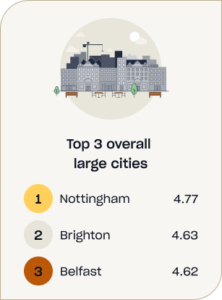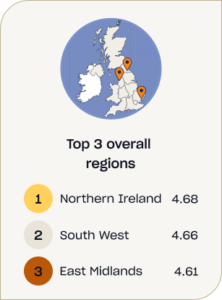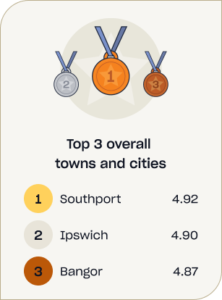Revealed: The best and worst places in Wales for food hygiene ratings as country falls to 9th in the UK regional rankings
- Wales is one of only two regions to see a drop in average rating from 2022, by 0.01.
- Gwynedd has the highest average rating in Wales, just as they did in 2022, scoring 4.83.
- Merthyr Tydfil has the lowest rating in Wales with an average of 3.92. It is one of only two regions in Wales with a rating below 4.
- Rhondda Cynon Taf, are second bottom, with a score of 3.95.
- Bridgend had the biggest rating increase, by 0.12 to 4.29. Denbighsire saw the biggest fall, by 0.17 to 4.30.
- Top three local authorities: Gwynedd, Wrexham, Anglesey
- Bottom three local authorities: Rhondda Cynon Taf, Blaenau Gwent, Merthyr Tydfil
The local authorities across Wales that score highest and lowest for their food hygiene ratings have been revealed, thanks to a report from online training provider High Speed Training.
The report, which analysed Food Standards Agency (FSA) data for over 218,000 food businesses across England, Scotland, Northern Ireland and Wales, found that in [region], the average food hygiene rating across all food establishments was 4.42 from almost 14,000 premises, which places Wales in 8th position when compared to regions of the UK.
However, a similar report run in 2022 by High Speed Training calculated Wales’ score at 4.43, showing that food hygiene standards have slightly worsened across the country.
The top ranking local authority in Wales was Gwynedd, with an impressive average score of 4.83 from over 1000 premises, meaning it would rank joint 3rd in a list of towns and cities from across the UK.
Bangor placed 3rd in the overall UK town and cities list, with a score of 4.87, up 0.09 from 2022.
The biggest improvers in Wales from the 2022 report were Bridgend (4.29), who improved their average scores by 0.17.
Cardiff (4.25) ranked 14th in Wales, with almost one in three takeaways (31%) and 18% of restaurants and cafes in the city scoring a three or below for their rating.
Swansea placed 12th in Wales, with a rating of 4.34. 36% of the city’s takeaways scored a 3 or below for their food hygiene rating, along with 12% of restaurants and cafes.
The lowest average rating in Wales went to Merthyr Tydfil, with an average score of 3.92, meaning that they would rank bottom when compared to towns and cities across the UK.
High Speed Training’s report also found that more than 1 in 4 takeaways (27%) across Wales scored 3 or below for their food hygiene rating, and that 85.7% of all premises scored a 4 or a 5, with 94% of hotels, BandBs and guest houses and 87% of restaurants and cafes achieving a 4 or a 5 for their score.
The Food Hygiene Rating Scheme (FHRS) is a partnership with local authorities in England, Wales and Northern Ireland. The scheme aims to provide customers with information as to how well a business is upholding food hygiene and safety standards.
Following regular inspections, ratings are devised based on the standard of food handling hygiene, the physical condition of the premises and facilities and food safety management practices.
These ratings are then made available on the Food Standards Agency (FSA) website and are usually visible from outside of the premises, often presented in a window near the entrance.
In Wales and Northern Ireland, it is compulsory for businesses to display their food hygiene rating. However, in England it is currently just considered best practice.
Paul Turner CEnvH, MCIEH, Senior Environmental Health Officer, North Yorkshire Council, said:“It’s incredibly important to take careful notice of food hygiene ratings when choosing where to eat. This information allows consumers to make informed decisions, and visit establishments that care about their safety. They also provide businesses an opportunity to show potential customers their commitment to maintaining standards. Hygiene inspections are unannounced, so they really do provide customers with a window into the kitchen.
“Food hygiene ratings are based on three broad areas – The physical condition of the premises, the food handling practices, and confidence in management. This includes staff training and the documented systems that are in place – what we might call ‘the paperwork’. All three are vital to ensuring that a business is operating safely and efficiently.
“The results that High Speed Training have found are encouraging, with 87% of premises across the UK scoring a 4 or 5, but there are always improvements that can be made. Robust food management systems, regular maintenance of the premises and correct and proper training are all needed to ensure that businesses can provide the best and most hygienic service to their customers.
Dr Richard Anderson, Head of Learning and Development at High Speed Training comments: “One of the biggest responsibilities as a food establishment is ensuring that food safety and hygiene practices are thorough and up to date. This is why it’s so important for customers to check FHRS ratings – they are a direct reflection of how safely and hygienically that establishment operates.
“Our report shows that, on average, standards remain high across the UK, and have slightly improved from 2022. For businesses that perform well, a high rating is a real selling point. However, establishments with a low hygiene rating can be extremely off-putting for customers, which ultimately have a significant impact on reputation and profitability.
“Correct food hygiene training for staff, alongside robust food management procedures and everyday good practices are crucial to keep performing at high standards.
“And for those customers turning a blind eye when it comes to checking a hygiene rating, we would definitely urge you not to as ignorance isn’t always bliss! We would always recommend checking hygiene ratings before eating at an establishment so you can make an informed call as to whether you eat there.”

|
| Help keep news FREE for our readersSupporting your local community newspaper/online news outlet is crucial now more than ever. If you believe in independent journalism,then consider making a valuable contribution by making a one-time or monthly donation. We operate in rural areas where providing unbiased news can be challenging. |





























